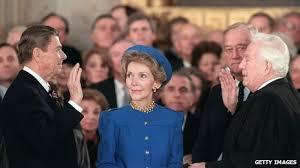 Funny how history twists and turns. Thirty years ago, on January 20th 1985, was Ronald Reagan's Second Inauguration.
Funny how history twists and turns. Thirty years ago, on January 20th 1985, was Ronald Reagan's Second Inauguration.
While his popularity was secure, having just won 49 states, his legacy was insecure.
This Inauguration symbolized the insecurity. Rather than a grand celebration with the type of horse- and band-filled parade Reagan mightily loved, the weather was so frigid that the swearing-in had to be held in the Capitol and the parade cancelled. The Inauguration was mostly a downer.
As was the scorecard on Reagan's foreign policy. Now heralded as the man who ended and even won the Cold War, Reagan was regarded then as the man who made it as frigid as that day.
In his first term, Reagan's launched four major innovations of foreign policy: 1) a huge U.S. military buildup; 2) denouncing the Soviet Union as "an evil empire" and Communism "as poised on the ash heap of history;" 3) proposing big, dramatic reductions in nuclear arsenals; and 4) launching the SDI, Strategic Defense Initiative.
But they hadn't produced much by that Second Inaugural day, except heightened tensions. Hence had Reagan been a one-term president like both his predecessor Jimmy Carter and his successor George H.W. Bush, he would now be judged an abject failure in foreign policy.
How much of a failure can be appreciated by glancing back at among the most prestigious publications of that era, Time magazine and the New York Times. Both describe the dangerous landscape of Reagan's years. Both attribute it largely to Reagan's dangerous leadership.
Time's premier edition each year is its "Man of the Year" issue, the most recent featuring as the "Men of the Year" a cover portrait of Ronald Reagan and Soviet leader Yuri Andropov back-to-back, poised for a duel. They stand ready to take ten paces apart, turn, and fire --not with pistols drawn, but with missiles launched. The Time cover story lamented how "the superpowers for the first time in 14 years [had] no arms-control talks of any kind in progress."
The main problem was, in a word, Reagan. "At times," the cover story revealed, "Reagan has talked of the Soviet Union as a phenomenon that a resolute West could cause to disappear." Something worse was identified next: "Moreover, Reagan's closest aides say he consistently speaks exactly this way in private."
In short, and most startling: Here was a president who said in public what he believed in private. Here was one who believed something as radical as that "a resolute West" might just cause the Soviet Union "to disappear."
While such a view sounded alarming to Time's diplomatic correspondent here, it sounded even worse to diplomats there: "To Soviet ears, the President seems not only to be denying the U.S.S.R.'s coveted claim to equal status with the U.S. as a superpower, but even challenging its right to exist as a legitimate state."
Though unflattering, Time's reporting was a bit short of the truth. Reagan was not only seeming to delegitimize the U.S.S.R.. He was in fact intending to do so.
Months after the most prestigious newsweekly's assessment came the most prestigious newspaper's verdict on Reagan's presidency. On October 28, 1984, the New York Times endorsed Reagan's opponent, Walter Mondale for President, citing as its "most important" factor "Mr. Reagan's diplomacy" which had taken "the nuclear arms race . . . to new heights." Reagan's "lifelong opposition to arms control" made him "unlike every other President of the nuclear era." That represented the conventional view at the time of the frigid Second Inauguration.
What then happened? The Soviet leadership changed, as Andropov died and the young, new-thinking Gorbachev came in.
On our side, Reagan held firm. The Establishment's harsh criticism of Reagan's four principles rolled off the President's back, but not off the Politburo's. All four had the effect of upsetting, and then upending, the Soviet system.
What many today pass off as nearly inevitable -- the fall of the U.S.S.R. and end of Communism as a credible belief -- was considered impossible 30 years ago. But Reagan pursued his four innovations during the Reykjavik summit the next year (October 1986), and then most notably in his June 1988 speech in Berlin featuring "Mr. Gorbachev, tear down this Wall!"
His persistence and innovations, along with changes in the Soviet leadership itself, brought the Cold War to an end, on terms only Reagan had foreseen: We win and they lose.